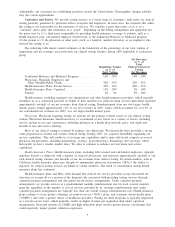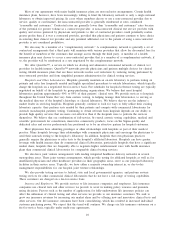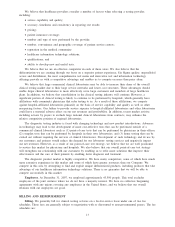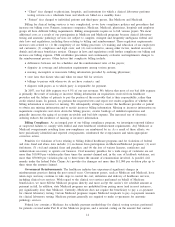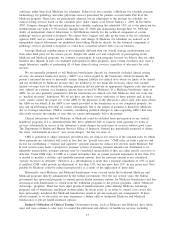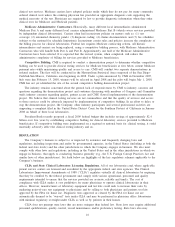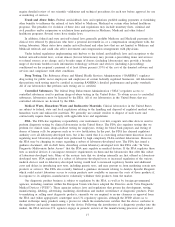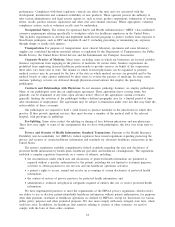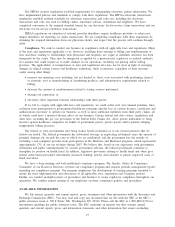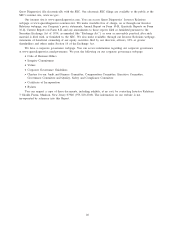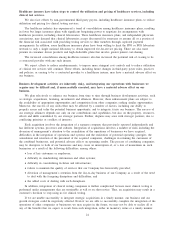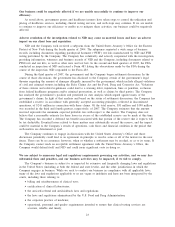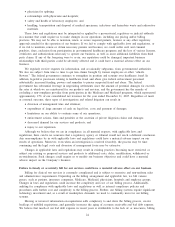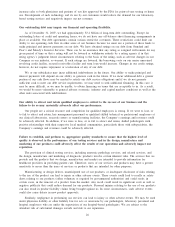Quest Diagnostics 2007 Annual Report Download - page 25
Download and view the complete annual report
Please find page 25 of the 2007 Quest Diagnostics annual report below. You can navigate through the pages in the report by either clicking on the pages listed below, or by using the keyword search tool below to find specific information within the annual report.clinical test services. Medicare carriers have adopted policies under which they do not pay for many commonly
ordered clinical tests unless the ordering physician has provided an appropriate diagnosis code supporting the
medical necessity of the test. Physicians are required by law to provide diagnostic information when they order
clinical tests for Medicare and Medicaid patients.
Medicare Administrative Contractors. Historically, many different local intermediaries administered
Medicare Part A and many different local carriers administered Medicare Part B (which covers services provided
by independent clinical laboratories). Carriers often had inconsistent policies on matters such as: (1) test
coverage; (2) automated chemistry panels; (3) diagnosis coding; (4) claims documentation; and (5) fee schedules
(subject to the national fee schedule limitations). Inconsistent carrier rules and policies increase the complexity of
the billing process for clinical laboratories. Federal law requires Medicare contracting reform. All historic
intermediaries and carriers are being replaced, using a competitive bidding process, with Medicare Administrative
Contractors who will handle both Part A and Part B. Approximately one half of the Medicare Administrative
Contractors have been selected. It is expected that the revised system, when completed, will reduce the
administrative complexity of billing for services provided to Medicare beneficiaries.
Competitive Bidding. CMS is required to conduct a demonstration project to determine whether competitive
bidding can be used to provide clinical testing services for Medicare beneficiaries at fees below current Medicare
payment rates while maintaining quality and access to care. CMS will conduct two separate demonstrations in
isolated markets. The first will be conducted in the Metropolitan Statistical Area composed of the San Diego-
Carlsbad-San Marcos, California area beginning in 2008. Under a plan announced by CMS in December 2007,
bids were due February 15, 2008, winners will be selected in April 2008 and the pilot will begin July 1, 2008.
CMS has not yet identified the site of the second competitive bidding demonstration project.
The industry remains concerned about the general lack of responsiveness by CMS to industry concerns and
questions regarding the demonstration project and continues discussing with members of Congress and Committee
staffs industry concerns regarding quality, patient access and CMS’ flawed implementation of the demonstration
project. We believe that clinical testing services are not commodities and that the quality of services and access
to those services could be adversely impacted by implementation of competitive bidding. In an effort to delay or
stop the demonstration project, the Company, other industry participants and several professional societies are
supporting a complaint filed in the United States District Court for the Southern District of California in January
2008 on behalf of three local laboratories.
President Bush recently proposed a fiscal 2009 federal budget that includes savings of approximately $2.4
billion over five years by establishing competitive bidding for clinical laboratory services provided to Medicare
beneficiaries. If competitive bidding were implemented on a regional or national basis for clinical testing, it could
materially adversely affect the clinical testing industry and us.
REGULATION
The Company’s business is subject to or impacted by extensive and frequently changing laws and
regulations, including inspections and audits by governmental agencies, in the United States (including at both the
federal and state levels) and the other jurisdictions in which the Company engages in business. We also must
comply with other laws and regulations, including in the United States and in the other jurisdictions in which we
engage in business, that apply to conducting business generally (e.g., the U.S. Foreign Corrupt Practices Act and
similar laws of other jurisdictions). Set forth below are highlights of the key regulatory schemes applicable to the
Company’s business.
CLIA and State Clinical Laboratory Licensing Regulations. All of our laboratories and, where applicable,
patient service centers are licensed and accredited by the appropriate federal and state agencies. The Clinical
Laboratories Improvement Amendments of 1988 (“CLIA”) regulates virtually all clinical laboratories by requiring
that they be certified by the federal government and comply with various operational, personnel and quality
requirements intended to ensure that the services provided are accurate, reliable and timely. The cost of
compliance with CLIA makes it cost prohibitive for many physicians to operate clinical laboratories in their
offices. However, manufacturers of laboratory equipment and test kits could seek to increase their sales by
marketing point-of-care test equipment to physicians and by selling to both physicians and patients test kits
approved by the FDA for home use. Diagnostic tests approved or cleared by the FDA for home use are
automatically deemed to be “waived” tests under CLIA and may be performed in physician office laboratories
with minimal regulatory oversight under CLIA as well as by patients in their homes.
CLIA does not preempt state laws that are more stringent than federal law. State laws may require additional
personnel qualifications, quality control, record maintenance and/or proficiency testing. State laws also may
16





